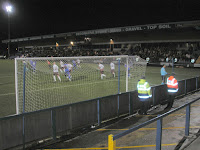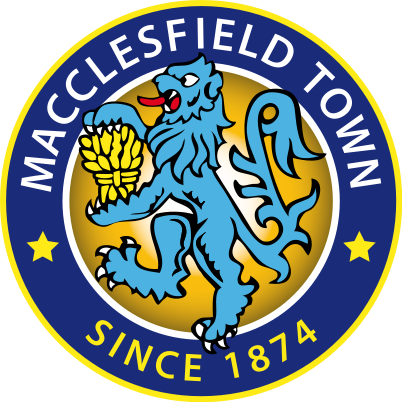Macclesfield Town FC are a football club who were formed in 1874. They come from the market town beased about half way between Manchester and Stoke on Trent, which was a prominent manufacturer of silk, hence the club nickname of 'The Silkmen'.
In 1890 Macclesfield joined The Combination and then the Lancashire Combination in 1911 as Macclesfield FC. The previous year Macclesfield moved into their Moss Rose home after playing games at Macclesfield Grammar School, Rostron's Field (near Coare Street) and Victoria Road (then known as Bowfield Lane). The club were also known as Macclesfield Football and Athletic Club and Hallifield FC in their early years. In 1919 'Macc' as they are known as locally, became founder members of the Cheshire County League.
The club remained in that league for nearly half a century, lifting six league titles in the progress while changing to Macclesfield Town in 1966. In 1968 Town became founder members of the Northern Premier League, where their reputation as one of non league football's foremost names continued. Town lifted the first two league championships and in the second of those seasons they also won the inauguaral FA Trophy when they defeated Telford United in the Wembley final.

There then followed a long period with nothing remarkable happening, until a third Northern Premier League title was lifted in 1987 with promotion to the Football Conference. The Silkmen reached the FA Cup Third Round that season, eliminating Carlisle United and Rotherham United along the way before Port Vale defeated them. It matched the clubs previous feat in the 1967-68 season when Fulham ended their run when Wigan Athletic and Stockport County were amongst their victims.
In 1989 Town reached Wembley in a repeat of the first ever FA Trophy final. This time Telford United won by one goal to nil. Chester City moved into Moss Rose in 1990 for a couple of years while their new Deva Stadium was being built, giving the ground a welcome facelift. In 1993 the previously successful manager Peter Wragg was replaced by former Manchester United hero Sammy McIlroy after the team flirted with relegation.
McIlroy took the team to the Conference title in only his second season in charge but remarkably despite Moss Rose previously staging action in the Football League, the new stricter gradings deemed the stadium unfit, so promotion was denied. However they were not to be denied as they lifted the title again two years later and were admitted to the League in May 1997 in place of Hereford United after Moss Rose had been upgraded.
Town finished runners up in their first season and won promotion to the third tier finishing the season with an unbeaten home record. Unfortunately their new status was too much and they were relegated after just one season. The highlight was probably the local derbies with Stoke City and Manchester City. It was the second of those games that has led to the "We're not really here" song coming about that Man City fans sang all the way on their run from Macc to the Champions League and beyond.
McIlroy left soon afterwards to become the manager of Northern Ireland as the club went through a succession of managers as they finished in lower mid table on a regular basis. The experienced Brian Horton took on the reigns in 2004 and the following season The Silkmen reached the play offs, but were defeated in the semi finals by Lincoln City. In September 2006 with the team bottom of the league and winless, Horton was sacked to be replaced by Paul Ince.
Macc reached the FA Cup Third Round where Chelsea beat them 6-1 at Stamford Bridge, and they survived relegation on the final day of the season following a victory against Notts County. Ince departed afterwards to become the manager of MK Dons. In 2007 Town initially expressed an interest in moving to a new stadium south of the town. Ian Brightwell had a spell as boss before successful lower and non league manager Keith Alexander was appointed in February 2008.
Alexander was doing a fine job with limited resources. However tragedy struck when he died suddenly on the 3rd March 2010. He had suffered a brain aneurysm in 2003, but all seemed well at the time of his death after returning home from an away fixture at Notts County. His assistant Gary Simpson took over as manager as the club suffered further awful news as midfielder Richard Butcher died in his sleep in January 2011, aged only twenty nine. The club retired the number 21 shirt in his honour.

News on a possible new stadium made a large move forwards in November 2011, when news that leading regeneration experts St Modwen had signed up to lead the process. The stadium would also accommodate sporting and leisure facilities for the whole community if given the go ahead.
Simpson's side struggled in the 2011-12 season, which saw him depart around New Year to be replaced by Brian Horton. Unfortunately the experienced boss could not keep Macc up, as a terrible run of form saw them demoted back to the Conference. Steve King came in as manager and led the side to the fourth round of the FA Cup for the first time in the clubs history after defeating Cardiff City in the third round.
After The Silkmen failed to reach the play offs King was sacked. Club stalwart John Askey was appointed with the club in a perilous financial state.
Macclesfield Town will play in the Football Conference in the 2013-14 season
My visit
Macclesfield Town 3 Scarborough 1 (Saturday 7th February 1989) Football League Division Three
Both Macc and Boro were in the race for automatic promotion so when I heard of a spare seat with my pals in the Filey John's peoples carrier I grabbed the chance of a ride. I was working on a casual basis at Greaves' Print at the time, so I had a few spare quid at the time. I went out with some pals on the Friday evening and ended up not getting home.
I rung Bunner the next morning so I could be collected on the way out of town. I felt pretty ordinary to be honest and not really dressed for an afternoon on an open away end close to the Pennines. We collected Carl Ellis at Norton and he thoughtfully gave me the loan of a fleecy jacket. We stopped at Micklefield at a cafe the lads new about for a life saving bacond sarnie!

Carl said he knew a quicker route to Macclesfield, but it meant going down the M1 and cutting over Snake Pass to cut out Manchester on the south of the city. We went past the mining town of Dodworth when I happened to mention that this was where King Arthur hailed from. I was trying to get a bite from my political sparring partner, hence my reference to former leader of the National Union of Miners, Arthur Scargill. Bunner, bang on the ball as ever said, "Who. The tattooist"? (for youngsters or non Scarborough folk, King Arthurs was a tattoo shop in the town).
We ended up following Macc centre back Effe Sodje for a few miles towards the ground. By the outskirts Bunner was doubled up in the back needing to find the nearest loo. We had fun galore mentioning all kinds of water references, as well as telling John to look out for Leek Road where the stadium was located. We eventually found it and parked up, much to our hero's relief!
We went into the pub located on the corner of the ground near to the away end for a few drinks. I slowly started coming to life as the pub started filling. The locals were getting served a lot easier than us, much to Carl's annoyance. He also noted that the juke box was the worst he'd ever seen. He reckoned every artist on it was dead!
We went inside Moss Rose to stand on the decent sized away open terraced away end. There was a reasonable turn out of Seadogs, numbering over two hundred. To our left was a few rows of open terracing with the Main Stand stood behind it in the centre. The far Star Lane End had been covered for a few years. In an unusual arrangement it had seats added in front of the terrace so the ground met its required amount of seating. To our right there was a covered enclosure for standing spectators with a mixture of roofing.
Macc were too quick and powerful for what was generally a very decent Boro team and were three up by the break, with all the goals going in the net in front of us to extend the agony. Thankfully the away end had a decent catering stand so I could eat and buy warm drinks as I was very cold. We got a consolation for our devotion when Gareth 'Gripper' Williams netted towards the end. Despite a bit of pressure, it was too little too late to salvage anything.


We went home over the hills through Buxton and the southern outskirts of Sheffield before joining the motorway and then A64 back to the coast. I had a couple of pints at the Gas Club and contemplated going down town again, but common sense prevailed and I headed home for a much needed rest.
Since my visit
Moss Rose has been improved considerably with the addition of a new full length seated stand opposite the Main Stand with corporate boxes at the rear. The ground also had new corner floodlight pylons installed in each corner.
The latest pictures that are used on this page were taken at the FA Cup replay against Chelmsford City in December 2011 by fellow hopper and Scarborough Athletic fan, Ian Anderson. Many thanks mate.




pFT-w~~0_12.JPG)

No comments:
Post a Comment